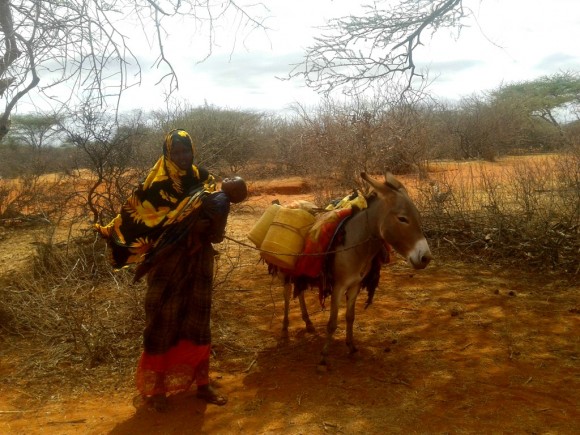Water shortages in Gedo region as a consequence of the El Niño phenomenon
Gedo region is part of Jubaland state in Somalia, bordering Ethiopia and Kenya. In 2015-2016, the El Niño phenomenon caused severe droughts throughout the region, resulting in food insecurity, out-migration and death of livestock. According to an assessment carried out by Puntland Humanitarian Affairs and Disaster Management Agency (HADMA), the current drought is being blamed on poor Deyr rains, namely the seasonal year-end short rains in South Somalia that affect the secondary harvest in January and February. This forced water prices up by more than 300-400 percent and weakened the agriculture, in a country where the majority of the population relies on agriculture, thus contributing to the declining social and economic environment.
Emergency water trucking to support drought-affected families
Mahamud, 57 year old from Goof village in Gedo region, is a beneficiary of the emergency water trucking intervention done by ACTED. The intervention enabled the communities to access water readily and curb the water shortage. Mahamud was relieved to know that a solution was found and his weak and dying livestock would be saved. He managed to dilute the distributed Aqua tabs water purification tablets into the community owned artificial reservoir, called ‘barkad’, which provided clean and safe drinking water for the locals and the weak livestock. With water readily available, most households have met the required quantity of daily water usage.

ACTED and its partner Social-life and Agricultural Development Organization (SADO) brought water by truck in 23 villages of Ceel waaq and Bardera districts. The intervention lasted five whole days, with significant impact especially for the most vulnerable groups such as children under 5, lactating mothers, people with disabilities, and the elderly. The Increasing distance to water points was forcing lactating mothers to travel 10-15 km to fetch water while carrying their infant babies on their back. The response improved water availability and enabled them to continue with the cash for work project activities, like garbage collection and waste management, which provide short term employment to vulnerable families in Ceel waaq and Bardera district.
Building a sustainable response to recurrent drought situation
Humanitarian aid agencies have been the only dependable response to the neediest populations in the region. Even with the high level of insecurity in some areas, ACTED has been pioneering full humanitarian actions towards communities to improve the devastating humanitarian needs in Ceel waaq and Bardera districts. However, there is an urgent need for a sustainable and permanent solution to the recurring drought situation. For now, accountable lifesaving programs have been implemented to the area through conditional and unconditional cash transfers, which has improved the existing communal assets and boosted household incomes as a recovery means to meet the immediate economic and financial needs of the beneficiaries.
This document covers humanitarian aid activities implemented with the financial assistance of the European Union. The views expressed herein should not be taken, in any way, to reflect the official opinion of the European Union, and the European Commission is not responsible for any use that may be made of the information it contains.
